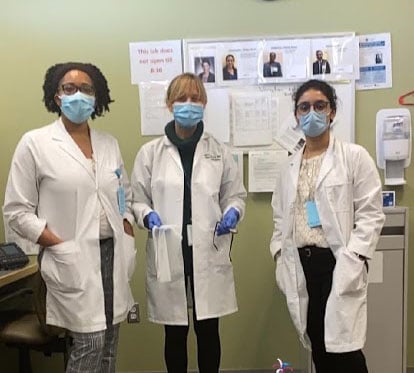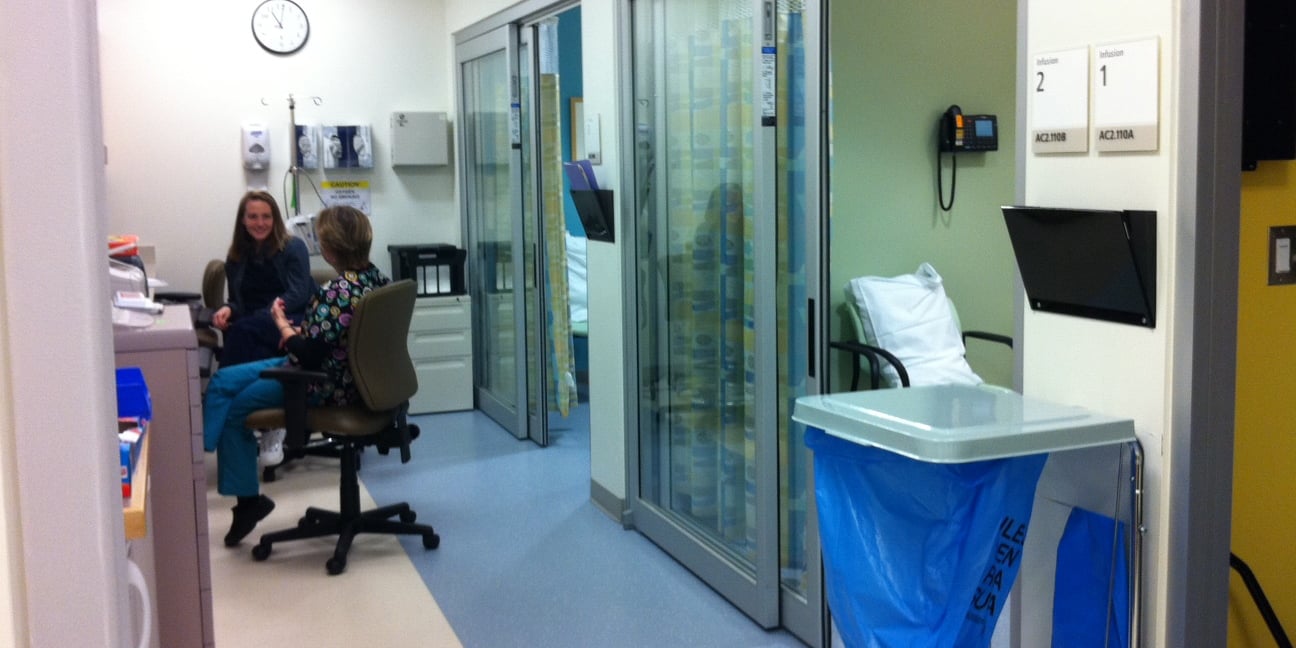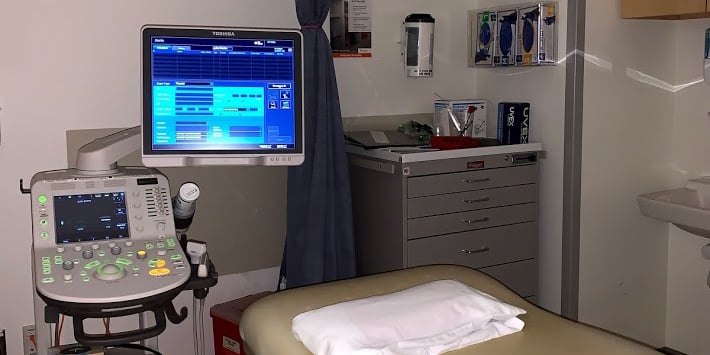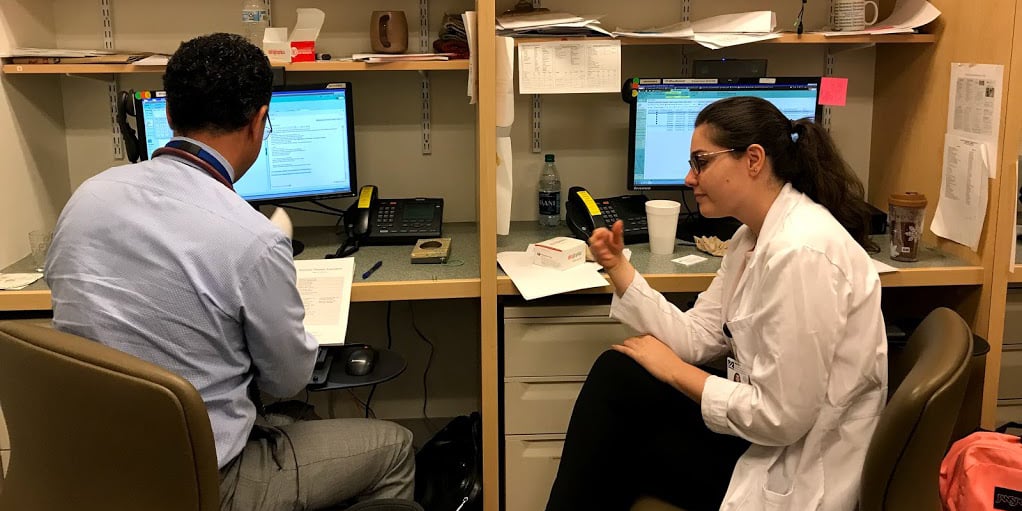Clinical Training
Our fellows receive extensive training in outpatient and consultative Endocrinology through the two main campuses of UMass Memorial Health Care.
Inpatient Experience
Most of the inpatient clinical experience occurs at the University campus, with up to 10% taking place at the nearby Memorial Campus. The inpatient service is typically 100% consultative.
Blood glucose management service
During the Blood Glucose Management Service (BGMS) rotations, the trainee sees inpatients referred for blood glucose management in the University and Memorial campuses. This includes care of perioperative patients, patients admitted and/or recovering from diabetes emergencies, and patients on insulin pumps and continuous glucose monitoring, and those with special circumstances (e.g. patients with specific comorbidities such ASCVD or hypertriglyceridemia, those on high dose steroids, those on enteral/parenteral nutrition, secondary diabetes, etc.).
Patients range from those treated with oral agents to those requiring IV or continuous subcutaneous insulin or concentrated insulins. Fellows will develop a proficiency in several areas (e.g. management of inpatient diabetes, and in bedside teaching of newly diagnosed patients or patients newly started on insulin, establishment of glucose monitoring, and teaching survival skills for diabetes). Other proficiencies include transitioning patients to subcutaneous regimens and ensuring transition to appropriate outpatient regimens based on the clinical setting.
Fellows rotate through the BGMS between 2-4 months per year, for a total of 5-6 months during their training. Each rotation is two weeks in length.
Endocrine consult service
Fellows in this service will see all patients referred for endocrine issues other than diabetes management in both the University and Memorial campuses. Trainees are exposed to a wide variety of cases that includes the more common as well as rare and complicated endocrine cases. This includes patients admitted with hypocalcemia, hypercalcemia, severe hypothyroidism (myxedema) or hyperthyroidism (thyroid storm), adrenal insufficiency, Cushing’s syndrome, apoplexy, pituitary tumors, hyponatremia/hypernatremia and hypertensive emergencies from pheochromocytoma. Trainees also routinely see patients who are admitted for osteoporotic hip fractures, and patients who have undergone thyroid, parathyroid, and pituitary surgery, as well as those who had adrenalectomy for functioning tumors. Fellows rotate through the Endocrine Consult Service between 2-4 months per year, for a total of 5-6 months during their training. Each rotation is two weeks in length.

Ambulatory Experience
The ambulatory experience for trainees consists of their own longitudinal continuity clinics as well as attendance in various faculty clinics when on ambulatory or elective rotations.

The division of Endocrinology has active outpatient clinics treating common endocrine disorders, such as thyroid and metabolic bone diseases as well as pituitary, reproductive, parathyroid and adrenal diseases. We attract patients from central Massachusetts and the greater New England region. Our Thyroid Center is accredited by the American Institute of Ultrasound Medicine. We have a multidisciplinary Metabolic Weight Loss Program.
The Diabetes Center of Excellence provides a full range of diagnostic and evaluation services for patients with diabetes mellitus. We care for over 10,000 patients with diabetes, including over 800 people on continuous subcutaneous insulin infusion (pump therapy). Our diabetes clinic is a multidisciplinary program that includes certified diabetes educators, dieticians, exercise physiologists, nurse practitioners as well as on site ophthalmology, nephrology, and behavioral medicine services. Our diabetes education program is certified by the American Diabetes Association.
The Adult Endocrinology clinic, Pediatric Endocrinology Clinic and the Diabetes Center of Excellence are located on the second floor of the Ambulatory Care Center at the University Campus. This state-of-the-art building opened in August 2010, and blends patient care, teaching and cutting-edge research within. Our facilities include point of care testing, on-site diabetes education facilities, two dedicated ultrasound/biopsy rooms, and a 3-bed infusion center for IV therapy and for endocrine dynamic testing.
Continuity clinics
Fellows who are not in the inpatient Endocrine or BGMS service have two endocrine continuity clinics and one diabetes continuity clinic per week throughout their fellowship. Fellows on Endocrine consult service have one clinic per week in endocrinology and diabetes, while those on BGMS have no continuity clinics during their rotation. In these continuity clinics, fellows serve as primary providers for their patients, and follow a panel of ambulatory patients throughout their fellowship.
Attending and elective clinics
In addition to continuity clinics, fellows in the ambulatory block rotate through clinics of faculty in Endocrinology and Diabetes, who have varying patient panels and expertise. These include rotations in general endocrinology and diabetes clinics, obesity clinic, thyroid biopsy/ultrasound clinics and gestational diabetes clinic sessions. Fellows also rotate through reproductive endocrinology and menopause clinics at Memorial Hospital.
During their elective months, fellows rotate through clinics in pediatric endocrinology, lipid clinic (Cardiology), the eye center, and behavioral psychology. Working with the Division of Nuclear Medicine, endocrine fellows gain competency in reading bone density scans and have opportunities to be closely involved with performance of thyroid/whole body scans and radioactive iodine therapy.

